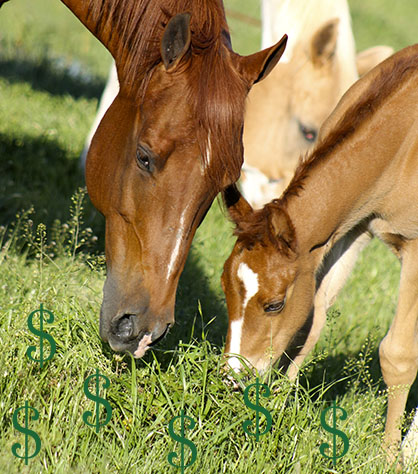Congress Passes Tax Bill with Horse Benefits; President Intends to Sign
In what might be seen as a thaw in Congressional relations, a bi-partisan tax bill, with multiple provisions favorable to the horse industry, has now been passed by Congress. Although the bill has now touched down safely, there were a few gusts and swells that threatened its passage right up to the end. President Obama has signaled he will sign it shortly.
The $622 billion bill extends or reinstates multiple tax provisions that have been raised, lowered, or allowed to expire over the last decade. Some have now been made permanent in the new bill; others extended for one or two years; but all are retroactive to January 1, 2015 so horse owners and industry stakeholders can take advantage of them for this year.
The bill, called the Protecting Americans from Tax Hikes Act of 2015, includes several provisions important to the horse industry and championed by the American Horse Council for some time. These benefits include making all race horses depreciable over three years; the ability to immediately expense or write-off up to $500,000 in depreciable business property; and bonus depreciation, which allows the deduction of 50% of the cost of new property purchased and placed in service. All of these provisions apply to horses and other assets used in a horse business.
The bill reinstates the 3-year-depreciation schedule for all race horses for all of 2015 and 2016. “This means that if an owner has begun training or racing a horse this year, or will begin training or racing it next year, the three-year depreciation schedule will apply. Owners and trainers don’t have to get involved in deciding when to begin training the horse to qualify for the 3-year period, rather than 7 year; it is automatic for all race horses placed in service in 2015 and 2016. The provision allows horse owners to begin training their race horses when they think best and take advantage of the shorter three-year period,” noted American Horse Council president Jay Hickey. “Most horses race over three years, not seven, so this is really a fairer schedule.”
The bill also raises the so-called Section 179 business expense deduction back to $500,000 and makes it permanent, effective January 1, 2015. It had reverted to $25,000 for 2015. This change will allow anyone in the horse business to immediately depreciate up to $500,000 of the cost of any investment in industry assets, including horses, fences, equipment, tack, trucks, etc., purchased and placed in service in 2015 and 2016. The deduction is still reduced dollar-for-dollar once investments in all one’s business activities hit $2 million.
“The 179 expense deduction is a real stimulus to the $102 billion horse industry and will support thousands of jobs,” said Hickey. “And it applies to all depreciable assets used in the horse business, including horses, be they yearlings, race or show horses, mares, stallions, or breeding shares.”
The bill restores bonus depreciation for qualifying new property, including assets used in the horse business, such as yearlings and other equipment, purchased and placed in service during 2015 through 2019. It had expired for 2015, but is now restored to 50 percent for business property placed in service during 2015, 2016 and 2017. It then phases down to 40 percent in 2018, and 30 percent in 2019. The first use of the horse or equipment must begin with the taxpayer. Yearlings are eligible for bonus depreciation and new equipment, but not horses like mares or stallions that have raced, shown, or been bred, since they have already been used.
The extender bill would also restore and make permanent favorable tax treatment for land donated for conservation purposes, particularly land donated by farmers and ranchers.
The AHC has been working to have all these provisions increased or reinstated and is pleased they have been acted upon. They have been made retroactive to cover all of 2015. “We had hoped these provisions would have been extended earlier in the year. This would have made planning and decisions to invest in the horse business easier. Congress apparently follows the ‘better late than never schedule’,” said Hickey.
As the national association representing all segments of the horse industry in Washington, D.C., the American Horse Council works daily to represent equine interests and opportunities. Organized in 1969, the AHC promotes and protects the industry by communicating with Congress, federal agencies, the media and the industry on behalf of all horse related interests each and every day. The AHC is member supported by individuals and organizations representing virtually every facet of the horse world from owners, breeders, veterinarians, farriers, breed registries and horsemen’s associations to horse shows, race tracks, rodeos, commercial suppliers and state horse councils.











